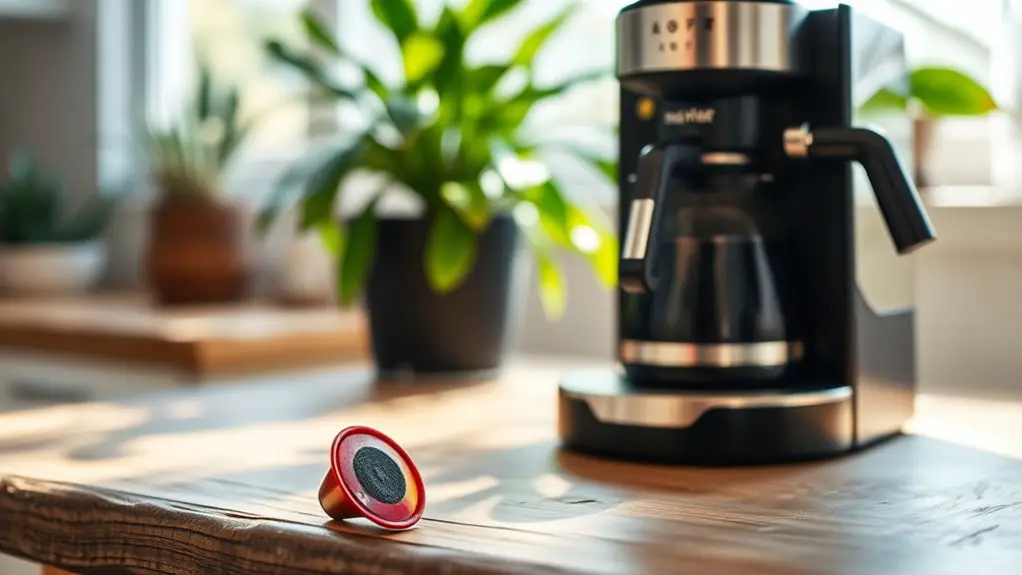Coffee makers have a notable environmental impact, mainly through their carbon footprint, energy consumption, and waste generation. Many machines waste electricity during brewing, and single-serve coffee pods contribute considerably to plastic waste, often ending up in landfills. By choosing energy-efficient models and sustainable brewing methods like pour-over or French press, you can lessen your impact. Exploring eco-friendly practices not only benefits the planet but also enriches your coffee experience. There's even more to discover about making greener choices.
The Carbon Footprint of Coffee Makers
When you brew your morning cup of coffee, have you ever thought about the carbon footprint of your coffee maker? The journey from coffee production to your cup involves a significant lifecycle assessment that often gets overlooked. Each machine, from drip to single-serve, carries an environmental cost tied to materials, manufacturing, and disposal. While you might savor that rich aroma, consider how much energy and resources went into creating your coffee maker. By choosing a model with a lower carbon footprint, you're not just enjoying a beverage; you're embracing a choice for freedom—freedom from environmental harm. Understanding this connection empowers you to make informed decisions that align with your values and promote a more sustainable future for coffee lovers everywhere.
Energy Consumption and Efficiency
Although you might not think about it while brewing your coffee, the energy consumption of your coffee maker plays an essential role in its overall environmental impact. Many coffee makers are energy hogs, wasting electricity while you savor your daily cup. By choosing models with energy-saving technologies, you can markedly reduce this waste. Look for coffee makers that promote efficient brewing, minimizing the power needed to heat water and brew your favorite blend. Not only will you be contributing to a greener planet, but you'll also save on your energy bill. Embrace the freedom that comes with making eco-conscious choices—your coffee ritual can be both enjoyable and sustainable. Make a switch today, and you'll feel empowered by your positive impact! Additionally, consider selecting energy-efficient coffee makers that are designed with sustainable practices in mind.
Waste Generation From Single-Serve Pods
While energy efficiency is important, another significant aspect of coffee makers that often goes unnoticed is the waste generated from single-serve pods. These convenient options may brew your coffee quickly, but they leave behind a staggering amount of plastic waste. Have you considered the environmental impact?
The convenience of single-serve coffee pods comes at a steep environmental cost, leaving behind vast amounts of plastic waste.
- Most single-serve pods aren't recyclable.
- Millions end up in landfills each year.
- Environmental regulations are tightening, urging companies to innovate.
- Pod recycling initiatives are emerging, but participation remains low.
- You can advocate for better recycling practices in your community. Additionally, it's worth noting that Kirkland K-Cups are not completely recyclable, which contributes to the overall waste problem.
Sustainable Alternatives to Traditional Coffee Makers
As the coffee industry faces increasing scrutiny over its environmental impact, many consumers are seeking sustainable alternatives to traditional coffee makers that can minimize their ecological footprint. Manual brewing methods, like pour-over or French press, offer a hands-on experience that not only elevates your coffee ritual but also reduces energy consumption. By ditching single-use pods and opting for reusable filters, you can considerably cut down on waste. These practices not only foster a deeper appreciation for your brew but also align with a freedom-focused lifestyle that values sustainability. Embracing these alternatives empowers you to enjoy your coffee guilt-free, knowing you're making a positive impact on the planet. Additionally, using traditional mortar and pestle can enhance your coffee preparation while further minimizing the environmental impact. Why not take the plunge and explore these eco-friendly options today?
Eco-Friendly Practices for Coffee Lovers
If you're passionate about coffee and want to lessen your environmental impact, adopting eco-friendly practices can transform your daily ritual. You can enjoy your favorite brew while being kind to the planet. Here are some simple yet effective ways to do it:
- Switch to reusable filters to cut down on waste.
- Opt for compostable cups instead of plastic ones.
- Buy coffee from local roasters to reduce transportation emissions.
- Use a French press or pour-over method to minimize energy consumption.
- Consider growing your own coffee plants if you have the space.
Frequently Asked Questions
Do Coffee Makers Contribute to Deforestation in Coffee-Growing Regions?
You might wonder if coffee makers contribute to deforestation. While they don't directly cause it, unsustainable coffee production practices do. Supporting sustainable farming can help protect forests and preserve the environment for future generations.
How Does Water Usage for Coffee Compare to Other Beverages?
When you plunge into the ocean of beverage comparisons, the water footprint for coffee often surprises you. It's less than that of tea or dairy, making coffee a relatively efficient choice in your daily indulgences.
Are There Certifications for Eco-Friendly Coffee Makers?
Yes, there are eco labels standards and sustainable certifications for coffee makers. You'll want to look for products certified by recognized organizations, ensuring your choice aligns with your values of environmental freedom and responsibility.
What Is the Lifespan of a Typical Coffee Maker?
A typical coffee maker lasts around five years, but with proper coffee maker maintenance and choosing durable materials, you can extend its life. Investing wisely allows you the freedom to enjoy great coffee longer.
Can Coffee Grounds Be Composted or Used in Gardening?
You'll be amazed—coffee grounds are gardening gold! They boost compost benefits, enriching soil with nutrients. So, toss 'em in your compost pile or sprinkle around plants for gardening tips that'll make your garden thrive!
